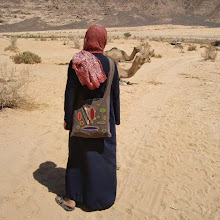
Wednesday, February 24, 2010
Aqaba Going Green!
Today I visited Theo Van De Laar at the Aqaba House in Aqaba's 9th Area. The Aqaba House is an eco-lodge bed and breakfast which employs some of the latest in green technologies and architecture in providing a simple yet elegant experience for its guests. The house's cooling system is solar-powered and it also uses solar cells for water heating. A grey water system waters the house's garden, which is host to a variety of local desert species. Significant portions of the building's decor come from recycled materials. Theo and I enjoyed grapefruit juice on the terrace, with a stunning view of Aqaba before us.


Saturday, February 20, 2010
Another Day, Another Sunset...
Wednesday, February 17, 2010
Vincent Carter Goes to Petra!
In early Febrary, Mrs. Kathy Belknap and I spent a day together in Petra. A beautiful sunny day at the height of the low season, we were able to explore the wonders of Petra with virtually no other tourists!
Upon special request from Kathy's granddaughter, Rim Metina-Belknap, a friend accompanied us to Petra. Vincent Carter is not only a member of Mrs. McCarter's second grade class in Raleigh, North Carolina, he is also a world traveler! Vincent and Kathy are pictured here in front of Petra's Treasury - the tomb of King Aretas IV who ruled the Nabatean city around the time of Christ.

Upon special request from Kathy's granddaughter, Rim Metina-Belknap, a friend accompanied us to Petra. Vincent Carter is not only a member of Mrs. McCarter's second grade class in Raleigh, North Carolina, he is also a world traveler! Vincent and Kathy are pictured here in front of Petra's Treasury - the tomb of King Aretas IV who ruled the Nabatean city around the time of Christ.

Monday, February 15, 2010
Entertainment under the Stars

Last night while I was visiting Diseh, Mehteb Zawideh dropped by with his oud. He was on his way to a gig but graced us with a few songs before leaving. The oud is an Arabic instrument similar to the lute. It is characterized by a pear-shaped body, eleven strings and a lack of frets - allowing more expressiveness on the part of the musician. Mehteb is a regular performer at many camps in Wadi Rum and recently produced two music videos. They'll be linked to shortly.
Monday, February 1, 2010
Law in the Desert
Last week, I enjoyed the company of Allan and Rachel Steyer, who were visiting Jordan for the first time from California. Allan practices law in San Francisco and his daughter, Rachel, is spending a semester studying Arabic in Amman. The three of us spent two days in Amman and Jerash and then, after dropping Rachel off at school, Allan and I took off on an adventure to the south!

The highlight of our southern trip was a visit with Harb Salem in Diseh, the village on the northern edge of the Wadi Rum Protected Reserve. We spent our day with Harb touring the desert by jeep and over lunch had a fascinating discussion regarding the Bedouin justice system. Harb described a system of three courts - one for blood crimes, such as murder and assault, a second for crimes committed against women, such as harassment or more serious offences, and a third for civil crimes like theft or defamation. Through a simple, tribally accepted system of defendant and plaintiff testimonies, most problems within the Bedouin community are solved by one judge whose knowledge and experience are trusted by the entire community. Both Allan and I were intrigued by the similarities and differences to the American justice system and found that a gorgeous day in the desert was particularly enjoyable due to lessons learned and stories shared!


The highlight of our southern trip was a visit with Harb Salem in Diseh, the village on the northern edge of the Wadi Rum Protected Reserve. We spent our day with Harb touring the desert by jeep and over lunch had a fascinating discussion regarding the Bedouin justice system. Harb described a system of three courts - one for blood crimes, such as murder and assault, a second for crimes committed against women, such as harassment or more serious offences, and a third for civil crimes like theft or defamation. Through a simple, tribally accepted system of defendant and plaintiff testimonies, most problems within the Bedouin community are solved by one judge whose knowledge and experience are trusted by the entire community. Both Allan and I were intrigued by the similarities and differences to the American justice system and found that a gorgeous day in the desert was particularly enjoyable due to lessons learned and stories shared!

Subscribe to:
Comments (Atom)

